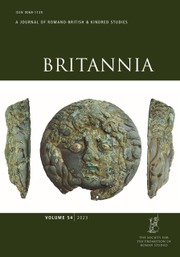Article contents
Barbarians in Gaul, Usurpers in Britain
Published online by Cambridge University Press: 09 November 2011
Extract
In the first decade of the fifth century Gaul and Britain, Spain and Italy all suffered from a succession of barbarian invasions and Roman civil wars. We possess not just one but several literary accounts of the crisis, along with chronicles, poetry, and imperial laws that all help to illuminate its course, but the sequence of events bristles with technical difficulties. These have not been satisfactorily resolved in the countless modern narratives of the period, which regularly depend on one another rather than the ancient sources. The most recent treatment of the topic, by John Drinkwater, appeared in the pages of this journal, and represents a tremendous advance on our understanding of the crisis. Drinkwater's analysis clarifies any number of crucial interpretative points, and should be the first port of call for any one interested in the study of the period. Problems nevertheless remain. Drinkwater's episodic treatment of the period encourages a certain obscurity that a more systematic narrative might dispel, and he relies heavily upon badly understood ancient slanders against the regent Stilicho to underpin important parts of his narrative. What follows is in no sense an attack on Drinkwater's magisterial interpretation of usurpation and crisis, which warrants wholehearted endorsement. Instead, I would like to suggest that the welter of modern literature on the crisis has blinded us to how little we actually know about it, and that only by maintaining a rigorous awareness of what actually appears in the primary sources can we hope to enjoy the fruits of more nuanced interpretation.
- Type
- Articles
- Information
- Copyright
- Copyright © Michael Kulikowski 2000. Exclusive Licence to Publish: The Society for the Promotion of Roman Studies
References
BIBLIOGRAPHY
- 16
- Cited by


